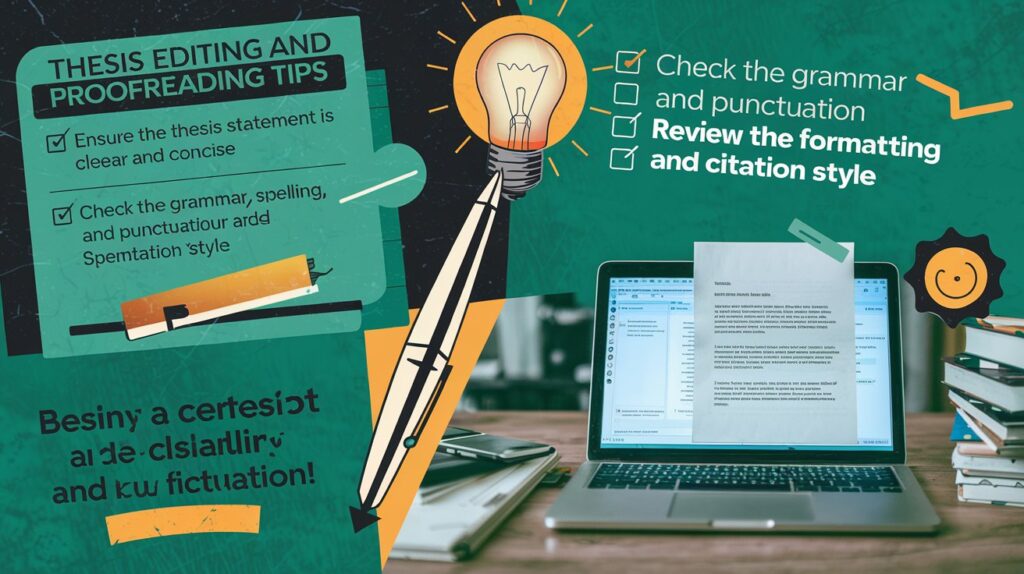Completing a thesis is a monumental achievement, but ensuring it is error-free and polished is equally critical. Thesis Editing and Proofreading play a vital role in enhancing the quality of your work, helping you to avoid costly mistakes that could jeopardize your academic success. This guide will provide essential tips to make your thesis flawless and impactful.

Why Thesis Editing and Proofreading Are Crucial
Your thesis reflects your hard work, dedication, and academic prowess. However, even the best research can lose credibility due to avoidable mistakes. Thesis Editing and Proofreading ensure that your document is clear, coherent, and professional. These processes help to:
- Correct grammatical, spelling, and punctuation errors
- Improve sentence structure and readability
- Ensure adherence to formatting guidelines
- Verify the accuracy of references and citations
- Eliminate redundancies and inconsistencies
By dedicating time to proper Thesis Editing and Proofreading, you can submit a thesis that meets academic standards and impresses evaluators.
Common Mistakes in Thesis Writing
Before diving into tips, it is essential to recognize common errors that students make:
- Grammatical Errors: Even minor grammar mistakes can undermine your thesis’s credibility.
- Inconsistent Formatting: Variations in font size, spacing, or citation styles can distract readers.
- Weak Argumentation: Failing to connect evidence to claims weakens the overall impact.
- Plagiarism Issues: Overlooking citation requirements can lead to unintentional plagiarism.
- Redundant Content: Repeating ideas dilutes the clarity of your research.
Avoiding these mistakes through meticulous Thesis Editing and Proofreading is essential for success.
Top Thesis Editing and Proofreading Tips
1. Take a Break Before Editing
After completing your thesis, step away for a few days before starting the editing process. This break will provide a fresh perspective, allowing you to spot errors and inconsistencies more effectively. Thesis Editing and Proofreading require a clear mind and focus.
2. Use Editing Tools Wisely
Tools like Grammarly, ProWritingAid, and Hemingway App can identify grammar, spelling, and style issues. While they are helpful, remember that no tool can replace human judgment. Use them as a starting point in your Thesis Editing and Proofreading process.
3. Focus on Structure and Flow
Ensure that your thesis has a logical structure. Each chapter should transition smoothly into the next, maintaining a coherent narrative. During Thesis Editing and Proofreading, check the flow of arguments, ensuring they build upon each other logically.
4. Verify Formatting Guidelines
Every institution has specific formatting requirements. Double-check margins, font size, spacing, and citation style. Adhering to these guidelines is crucial during Thesis Editing and Proofreading to avoid deductions in marks.
5. Check for Plagiarism
Use plagiarism detection tools like Turnitin or Copyscape to ensure originality. Proper citation of sources is a critical aspect of Thesis Editing and Proofreading that cannot be overlooked.
6. Read Aloud for Clarity
Reading your thesis aloud helps identify awkward sentences and improve readability. This simple yet effective method can enhance your Thesis Editing and Proofreading process by highlighting areas that require rephrasing.
7. Focus on References and Citations
Ensure that all citations and references adhere to the required style, such as APA, MLA, or Chicago. Missing or incorrect citations can lead to plagiarism accusations. Diligent Thesis Editing and Proofreading of your bibliography are essential.
8. Seek Feedback
Ask peers or mentors to review your thesis. They can provide valuable insights into areas that need improvement. Incorporating feedback is a vital part of effective Thesis Editing and Proofreading.
9. Edit in Multiple Rounds
Editing in multiple stages helps maintain focus. Start with a macro-level review, focusing on structure and content. Then, move to micro-level details like grammar, spelling, and punctuation. A phased approach to Thesis Editing and Proofreading ensures thoroughness.
10. Consider Professional Services
If you’re pressed for time or lack confidence in your editing skills, consider hiring professional Thesis Editing and Proofreading services. Experts can provide an unbiased review, ensuring your thesis is polished to perfection.
The Role of Professional Thesis Editing and Proofreading Services
Professional editors bring a wealth of experience and expertise to the table. They can:
- Enhance the clarity and coherence of your thesis
- Ensure compliance with academic standards
- Identify overlooked errors
- Provide constructive feedback to strengthen arguments
Investing in professional Thesis Editing and Proofreading can save you time and significantly improve the quality of your work.
Conclusion
Thesis Editing and Proofreading are critical steps in the thesis-writing process. By dedicating time to refine your work, you enhance its quality, credibility, and impact. Follow these tips, seek feedback, and consider professional help if necessary. With careful attention to detail, you can submit a thesis that truly reflects your academic excellence.
Start your journey toward academic success today by making Thesis Editing and Proofreading a priority in your research process.
